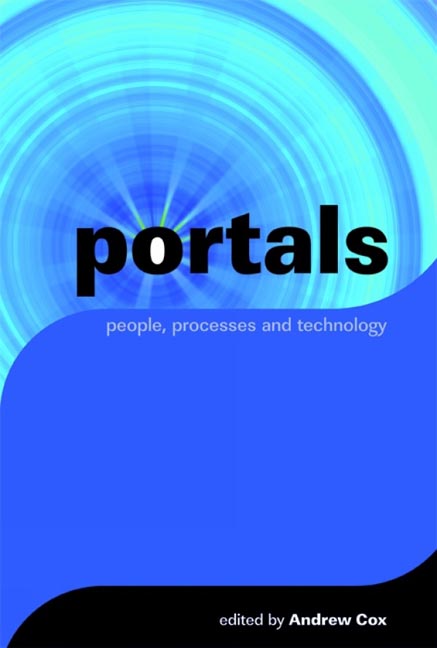Book contents
- Frontmatter
- Contents
- Introductory preface
- Section 1 Core themes
- Section 2 The library and the portal
- Section 3 The portal in the corporate sector
- Section 4 Portals in the public sector
- Section 5 The future
- 15 The future of portals?
- 16 Managing web-based information in an arts and humanities research environment
- 17 Portals and Web 2.0
- The contributors
- Index
15 - The future of portals?
from Section 5 - The future
Published online by Cambridge University Press: 09 June 2018
- Frontmatter
- Contents
- Introductory preface
- Section 1 Core themes
- Section 2 The library and the portal
- Section 3 The portal in the corporate sector
- Section 4 Portals in the public sector
- Section 5 The future
- 15 The future of portals?
- 16 Managing web-based information in an arts and humanities research environment
- 17 Portals and Web 2.0
- The contributors
- Index
Summary
Introduction
There are many types of portal: from library portals, institutional portals, subject portals and community portals to virtual research environments with portal functionality. This chapter focuses on the national portal developments at the UK's Joint information Systems Committee (JISC) and looks at the new standards that have come into recent prominence that allow embedding of portal services at a local level.
We must first acknowledge that the word ‘portal’ is not a straightforward term; it is used to cover a rather broad spectrum of products and information use scenarios. And in an environment that has grown richer in networked services a clear definition of what a portal is and does is not easy to articulate. It is difficult to predict where we might end up, but from current developments we can try to make some educated guesses and also look to what might be needed for this future.
JISC developments
The JISC has concentrated on the development of portals on a national level and focused on how to discover national resources. We could say this has so far been more of a top-down approach as opposed to the bottom-up approach of supporting portal developments within a local institutional environment. The JISC Portals Programme has so far developed portal projects in media, subject and community formats. The associated Presentation Programme aims to investigate and discover how different types of resources can be presented within a variety of web environments in ways that best benefit users. A number of studies have also been conducted in this area. Both of these programme areas aim to address the presentation and fusion layers of the Information Environment Architecture developed by UKOLN.
The portals developed within the JISC programme have a number of key features, encapsulated in a Baseline Portal Functional Specification. Thus, portals within the Information Environment are primarily discovery tools; they hold no content locally but provide access to dispersed content; they provide a common means of access to varied content sources; and they have a focus on the presentation of information to the user. All additional functionality should, in principle, be delivered by systems other than the portal itself. A range of JISC portals, each with its own emphasis (for example, subject based), has been developed to support access to information. Three strands exist within the programme, each addressing a particular emphasis.
- Type
- Chapter
- Information
- Portalspeople, processes and technology, pp. 203 - 208Publisher: FacetPrint publication year: 2006



